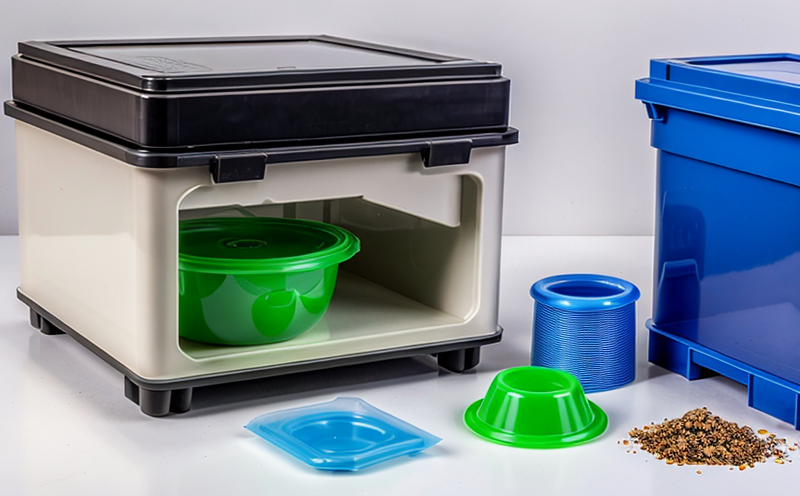ASTM F88 Seal Strength Testing of Flexible Plastic Packaging
The ASTM F88 standard specifies a method to determine the seal strength of flexible plastic packaging. This test is crucial in ensuring that the seals holding contents within packages are reliable and robust, preventing leaks or tampering. It is particularly important for products such as food items, pharmaceuticals, and other consumer goods packaged in flexible materials like multilayered films.
The ASTM F88 seal strength testing involves subjecting the sealed edges of a package to controlled tensile forces until failure occurs. The force at which this happens provides valuable insights into the integrity of the packaging. This test helps manufacturers identify potential weaknesses and optimize design parameters for improved performance.
Compliance with ASTM F88 is often required by regulatory bodies, ensuring that products meet safety standards and consumer trust expectations. Flexible plastic packaging plays a significant role in modern supply chains, and its seal strength directly impacts the shelf life and integrity of contained goods. By adhering to this standard, companies can enhance product quality assurance and maintain brand reputation.
Understanding the mechanics behind ASTM F88 testing is essential for those involved in the development, manufacturing, and quality control processes. The test setup includes a tensile tester equipped with specific grips designed to mimic real-world handling conditions. Specimens are cut from packaging materials according to precise dimensions specified by the standard.
The procedure involves several steps: preparation of the samples, application of sealant if necessary, positioning the sample in the tensile tester, and then applying a controlled force until failure occurs. Force-displacement curves are recorded during this process. These data points help analysts determine key performance indicators like peak strength, elongation at break, and modulus.
Interpreting these results requires knowledge of materials science principles to understand how different polymers interact under stress conditions. Factors influencing the outcome include thickness variations within layers of multi-layered films, additives used during production processes, and environmental factors affecting stored products over time.
Failure modes observed in ASTM F88 testing can provide critical information about defects or areas needing improvement in manufacturing processes. For example, if multiple samples consistently fail at a particular point along the seal line, it may indicate issues with adhesive bonding techniques or insufficient curing times during production.
In conclusion, ASTM F88 seal strength testing is an indispensable tool for quality assurance professionals working within industries reliant on flexible plastic packaging solutions. Its role extends beyond mere compliance; it serves as a vital means of ensuring product safety and maintaining consumer confidence in brand integrity.
Why It Matters
The significance of ASTM F88 seal strength testing cannot be overstated, especially for companies involved in packaging design and manufacturing. Reliable seals are crucial not only from a functional standpoint but also from an economic perspective. Ensuring that packages remain intact throughout distribution channels prevents loss due to leakage or contamination.
- Product Integrity: Properly sealed packages protect contents from external contaminants, maintaining their freshness and quality.
- Brand Reputation: Consistent performance in seal strength testing helps build trust among consumers who rely on brand consistency for product safety assurance.
- Economic Efficiency: By identifying seals prone to failure early in the production process, companies can minimize waste caused by damaged goods reaching retail shelves.
The economic implications extend further when considering potential legal ramifications associated with defective products. Meeting standards such as ASTM F88 demonstrates a commitment to safety and quality that can shield firms from liability lawsuits related to product failures resulting in harm or inconvenience for end-users.
Benefits
The benefits of conducting ASTM F88 seal strength testing are manifold, encompassing both operational efficiency and customer satisfaction. Firstly, it allows manufacturers to identify potential weaknesses early in the production cycle through rigorous quality control measures. This proactive approach ensures that faulty products do not proceed further into manufacturing stages, thereby reducing costs associated with rework or scrap.
Secondly, by adhering strictly to ASTM F88 guidelines during development phases, companies can ensure compatibility across various packaging configurations. This uniformity streamlines supply chain management and enhances logistical operations, ultimately leading to improved delivery times and reduced warehousing expenses.
Thirdly, successful implementation of ASTM F88 seal strength testing contributes significantly towards enhancing customer trust in the brand. When consumers perceive that a company invests heavily in quality assurance protocols like these, they are more likely to develop loyalty towards it. Such positive perceptions translate into increased sales volumes and market share growth.
Lastly, compliance with international standards such as ASTM F88 provides an additional layer of protection against non-compliance risks associated with regulatory actions or recalls. In today’s competitive environment where global markets are increasingly interconnected, maintaining strict adherence to recognized industry practices can serve as a strategic advantage for businesses operating internationally.
Why Choose This Test
The ASTM F88 seal strength testing offers several compelling reasons why it should be prioritized in your quality assurance strategy. One of the primary advantages is its ability to provide accurate and reliable data regarding the integrity of seals used in flexible plastic packaging.
- Precision Measurement: The test delivers precise measurements of force required to break the seal, enabling manufacturers to fine-tune their processes for optimal results.
- Consistent Results: By following standardized procedures outlined in ASTM F88, labs ensure consistent outcomes across different batches or variations of packaging materials.
- Rapid Detection: Early detection of any issues with seal strength allows for quick corrective actions to be implemented before they lead to significant disruptions downstream.
- Regulatory Compliance: Meeting this standard ensures that products meet necessary regulatory requirements, thereby avoiding costly delays or penalties.
In addition to these tangible benefits, choosing ASTM F88 seal strength testing also reflects a commitment to excellence in product quality. It demonstrates an understanding of the importance of maintaining high standards throughout all stages of production and distribution.





